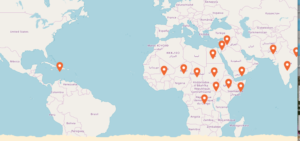CARE, which stands for Cooperative for Assistance and Relief Everywhere, is one of the oldest and largest humanitarian aid organizations with a focus on fighting against global poverty. They are known as a global leader dedicated to their “unshakeable commitment to the dignity of people” (CARE). It is an international and confederation of fourteen CARE National Members, each are registered as non-profit and non-governmental organizations. Some of the programs and topics that they address in the developing world include emergency response, food security, water and sanitation, economics development, climate change, agriculture, education, and health (Wieters). They also have a special focus on working with women in poverty and fighting for equality everywhere. They put a focus on helping women and girls because they “know we cannot overcome poverty until all people have equal rights and opportunities” (CARE). CARE believes they need to first address poverty’s root causes, and not just fight against its consequences.
Origin
CARE was founded in 1945 during World War II. They started by delivering packages to World War II survivors, known as CARE packages. Twenty- two organizations came together to deliver these packages and thousands of Americans helped with this effort. The first 15,000 packages were delivered to survivors in France. Soon after CARE began making their own packages that were mostly made from donations from different American companies. The packages included things such as blankets, clothes, medicine, school supplies, and books (CARE). Although the CARE packages ended a long time ago, it still remains a symbol for their vision and what they continue to do. Now, they focus on much more long-term projects and emergency relief. They deliver emergency aid to war and natural disaster survivors. CARE advocates at the local, national, and international levels for the rights of those in poverty.
Mission
CARE’s mission statement is to “work around the globe to save lives, defeat poverty, and achieve social justice” (CARE). Their values that they focus on to achieve this mission are integrity, diversity, excellence, and equality. There are hoping for a world of tolerance and social justice so all people can live with security. CARE’s mission is to first work with different communities to prepare for the impact of disasters, then they partner with local groups to provide assistance right after an emergency hits, and lastly they work with the survivors to help them recover. 90% of CARE’s expense go to their program activities: 76% of that goes to long-term solutions to poverty and 24% goes to emergency response and rehabilitation (CARE).
Scope
CARE worked in 92 countries last year and was able to reach 63 million people through their humanitarian aid programs. They had a reported income of $694.4 million in 2015 (CARE International). This map shows the places that they are providing relief to currently.
In 2020 CARE’s goals are to support 150 million people to overcome poverty and social injustice. This includes focusing on women and girls and helping them exercise their rights to sexual and maternal health, and increasing food security for 50 million vulnerable people (CARE).
Works Cited:
CARE, CARE, 7 Jan. 2019, www.care.org/.
“CARE International.” NGOmonitor, 22 Feb. 2017, www.ngo-monitor.org/ngos/care/.
Wieters, Heike. “Reinventing the Firm: From Post-War Relief to International Humanitarian Agency.” European Review of History, 26 Oct. 2015.


One Comment
Though their origin and structure are different than BRAC’s, I think CARE and BRAC are pretty similar in that they both adopt a holistic approach to working to end poverty and advancing social justice, including women’s equality, for vulnerable people and communities around the world. CARE is about 30 years older and in more locations than CARE, and it also started in a Global North nation and then expanded to the Global South, whereas BRAC began in the 1970s in Bangladesh and is only in 10 other locations currently, but I imagine these two organizations run frequently in the same circles, so to speak.
One Trackback
… [Trackback]
[…] Find More Informations here: blogs.elon.edu/soc3711903/?p=3717 […]